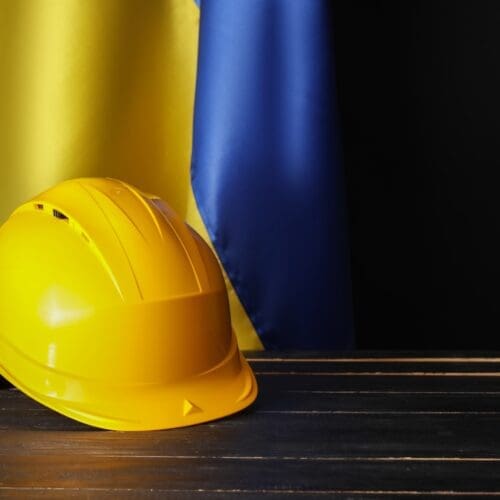Rebuilding Ukraine – construction opportunities on the horizon
February 2025Introduction
Ukraine’s construction industry has been significantly impacted over recent years for many reasons; the conflict with Russia, the Covid-19 pandemic, material shortages, price increases, and other political and economic global developments. However, with the latest press reports indicating potential peace developments in Ukraine, the focus has swiftly shifted back to the prospects of reconstructing the region.
In our earlier ‘Rebuilding Ukraine Series’ we considered the potential approach and core issues connected to rebuilding Ukraine, including around procurement; core contract conditions; funding; insurance; and investment opportunities. This update examines Ukraine’s post-war construction opportunities, potential funding sources, and strategies for contractors and consultants involved in rebuilding efforts.
The scale of construction opportunities in Ukraine
The ongoing conflict in Ukraine has resulted in extensive damage to the country’s infrastructure, housing, and essential services. As the war continued, the need for future reconstruction became increasingly apparent and urgent.
According to UN News and a joint Rapid Damage and Needs Assessment (RDNA3) released by the Ukraine Government, European Commission, World Bank Group, and United Nations (UN), the total estimated cost of rebuilding Ukraine over the next decade, as of 31 December 2023, was calculated to be $486 billion. It is possible that this projected cost has since increased, given the previous year’s estimate was $411 billion (equivalent to €383 billion), and likely further exacerbated by inflationary issues.
The reconstruction of Ukraine presents real opportunities for businesses to secure contracts involving complex and prominent projects. Likely areas of future focus or project types may include:
- Transport and infrastructure reconstruction: restoring critical infrastructure like roads and bridges which are essential to the country’s transport links, recovery and economic activity.
- Housing projects: large-scale residential developments may be planned to accommodate displaced people and rebuild communities. A significant amount of housing stock has been destroyed or damaged due to the conflict and will need replacement. The housing and utilities sector accounts for 20% of the overall estimated reconstruction costs identified in the RDNA3. Reports indicate state support for household programs in the region this year, and regional banks have considered providing interest-free loans.
- Commercial and industrial rebuilding: there are opportunities in restoring manufacturing facilities, warehouses, and commercial hubs, as well as reviving activity and economic recovery. In terms of location, some new construction activities have continued in the Kyiv and Lviv regions, which have accessible local transport routes and larger populations.
- Energy: the destruction of the Kakhovka Dam and hydropower plant in 2023 was reported to have significantly harmed the environment, and worsened access to housing, food, and water[1]. The emphasis will be placed on opportunities related to general energy infrastructure, including power plants, cables and grids, as well as energy security, resilience, and access. In November 2024, Ukraine announced plans for the development of over 800MW of wind generation facilities during 2025. These types of initiatives are expected to contribute significantly to other reconstruction efforts.
- Green recovery and sustainable construction: there may be a greater focus on environmentally sustainable and resilient building practices, energy-efficient projects, and the integration of green technologies to future-proof the country and align with broader climate goals.
- Debris clearance and management, and demolition: a significant amount of costs have been estimated for actioning this across all sectors.
Whilst these types of projects and activities offer major opportunities for construction, engineering, and infrastructure businesses, they also pose potential challenges (as we will cover in future updates).
Opportunities for domestic and international construction companies
International partners, such as the World Bank, European Commission and UN, will be integral to supporting Ukraine’s future reconstruction efforts. These organisations offer support, financial assistance, technical expertise, and policy guidance to facilitate a systematic and effective recovery. The Ukrainian Government may also aim to attract private investments to expedite reconstruction efforts and advance the nation’s integration into the European Union (EU).
Government funding and incentives
At the Ukraine Reconstruction Conference held in London in June 2023, over 400 global companies committed to supporting the rebuilding of the country. Similar conferences have been held in Switzerland, Italy, France, Germany, and Poland. Additionally, there have been reports of the EU, UK, and US pledging significant financial contributions.
In November 2024, the EU launched a Call for Expression of Interest (Call) to mobilise private EU business to invest in critical areas to support Ukraine’s recovery and reconstruction[2]. This followed the European Commission’s earlier endorsement and communications from September 2024[3]. EU businesses, including consortia or joint ventures, involving EU and Ukrainian companies, were invited to submit their proposals by 1 March 2025. The proposals will be reviewed and matched with appropriate investment projects funded by the Ukraine Investment Framework, which is part of the EU’s €50 billion Ukraine Facility. This initiative aims to promote business partnerships and EU private sector involvement in Ukraine’s recovery and reconstruction, while also supporting Ukraine’s further integration into the EU Single Market.
The six priority areas outlined in the Call align with the Ukraine Plan and the Strategic Orientations of the Ukraine Investment Framework[4] (identifying key economic sectors requiring Foreign Direct Investment to facilitate Ukraine’s socio-economic recovery), including:
- Construction materials: supporting reconstruction activities by investing in the construction material industry, construction supervisors, and construction companies.
- Information technology and digital transformation: enhancing and strengthening technology and digital infrastructure to increase innovation and growth across a range of sectors.
- Energy: the development of sustainable energy solutions, encompassing renewable energy initiatives and the modernisation of existing energy infrastructure.
- Critical Raw Materials: focusing on investment and processing minerals and resources, including those required for high-tech industries and renewable energy technologies.
- Processing industry and manufacturing: updating the manufacturing sector and boosting competitiveness.
- Transport and export logistics: replacing and upgrading public infrastructure, transport, and logistics to support connectivity and mobility.
We plan to cover more about the Call, together with the eligibility criteria and other points to note in a forthcoming article in this series. We anticipate that there may be other initiatives or incentives for Ukrainian and foreign construction and engineering businesses to participate in the reconstruction process. Based on other post-conflict reconstruction efforts, examples of incentives could also extend to possible grants, tax breaks, etc.
Potential funding and players
UK
Earlier press reports suggest that UK funding will be made available to Ukraine. In 2024, the Department for Business and Trade released updated guidance on initiatives to boost UK-Ukraine trade, improve market conditions, and support Ukraine’s critical and long-term reconstruction[5]. By way of a similar example, construction industry press has previously highlighted the potential opportunities available to UK organisations in international recovery efforts, such as from the Iraq reconstruction budget in 2008. Reports at that time had indicated that British engineering expertise, particularly in the areas of energy, infrastructure, and public works, was highly sought in the region affected by conflict.
It is a frequent practice for the UK Government/public sector to conduct public procurement processes for the appointment of construction and engineering works, as well as other services and goods. If the UK Government is providing funding, it is likely that numerous Tier 1 and Tier 2 contractors and consultants will have a significant interest in these projects, particularly due to their familiarity with procurement procedures and their experience in post-conflict reconstruction efforts.
Whilst there will be opportunities for businesses to undertake and execute projects benefitting Ukraine and its citizens, such opportunities and contracts will entail certain risks. Additional concerns regarding future UK involvement may also link to the broader political, economic, and regulatory environment and approach to long-term commitment. Nevertheless, given that many larger UK contractors and consultancy firms already have a history of supporting post-conflict recovery efforts over several decades, including in Afghanistan, Iraq, and parts of Africa, they are particularly well-suited to contribute effectively to Ukraine.
Poland
Regarding local supply chain expertise and resources, there may be an increased demand for Polish contractors and consultants. Poland is anticipated to play a significant role in Ukraine’s reconstruction, particularly following the UN’s announcement of the establishment of a UN Office for Project Services, a special UN agency for reconstruction issues. It is presently unclear whether such businesses will act predominantly as main contractors, subcontractors/trade contractors or subconsultants, although the approach to procuring contracts and available funding or resources will inevitably influence this.
It is also notable that “Rebuild Ukraine,” an international exhibition and conference, has been scheduled for November 2025 in Warsaw[6].
US
Donald Trump has been reported to have actively engaged in recent discussions aimed at ending the conflict in Ukraine. We understand from press reports that he has held conversations with both Russian President Vladimir Putin and Ukrainian President Volodymyr Zelenskyy. Trump has conveyed optimism about the potential for resolving the conflict, suggesting that there is a possibility of achieving peace. Consequently, Trump’s recent involvement may accelerate the need for such reconstruction efforts and influence interest within the US to secure related contracts in Ukraine. There are some major global contractors and consultants with headquarters in North America and presence in Europe who might benefit from this approach.
Other funding sources?
During the conflict, political leaders and organisations appear to have proposed that reconstruction and recovery efforts should also be financed through the imposition of sanctions and the confiscation of frozen Russian assets. The extent to whether such funding is feasible and the contribution this would provide in practice is yet to be confirmed.
Other considerations
In our next update we will consider the potential risks and challenges contractors/subcontractors and consultants should have in mind when tendering or negotiating future contracts for projects in Ukraine. We will also touch on how the future of construction law may evolve as a result of the efforts to rebuild.
Concluding thoughts
The urgent and extensive rebuilding efforts in Ukraine will inevitably present businesses in the construction, engineering, and infrastructure sectors with unique and significant opportunities to secure lucrative contracts on high-profile projects. It is crucial for businesses to be aware of the opportunities available, as well as the associated risks and impact of legal and regulatory frameworks.
Beale & Co has specialist expertise in advising across the lifecycle of projects in the UK and internationally. We will continue this update by publishing a series of short articles that will provide further guidance to businesses seeking more information and looking to support the rebuild. If you are interested in receiving a copy of these, please sign up to our mailing list online or email marketing@beale-law.com.
Beale & Co will be supported by law firm contacts under Lexicom (a network of independent commercial law firms across Europe founded by Beale & Co) in advising on such contracts, projects, and disputes. For more information on the above or how Beale & Co can provide legal support, please contact Antony Smith, or visit our website.
[1] UN News, Ukraine recovery and reconstruction: $486 billion over the next decade, 15 February 2024
[2] EU launches Call for EU business to invest in Ukraine’s recovery and reconstruction – European Commission, 13 November 2024
[3] Publication of the Call for expressions of interest from EU/EEA-based businesses to invest in Ukraine – European Commission
[4] Ukraine Investment Framework – European Commission
[5] Support for UK businesses helping to rebuild Ukraine – GOV.UK
[6] ReBuild Ukraine | 13-14 November 2025
Download PDF








